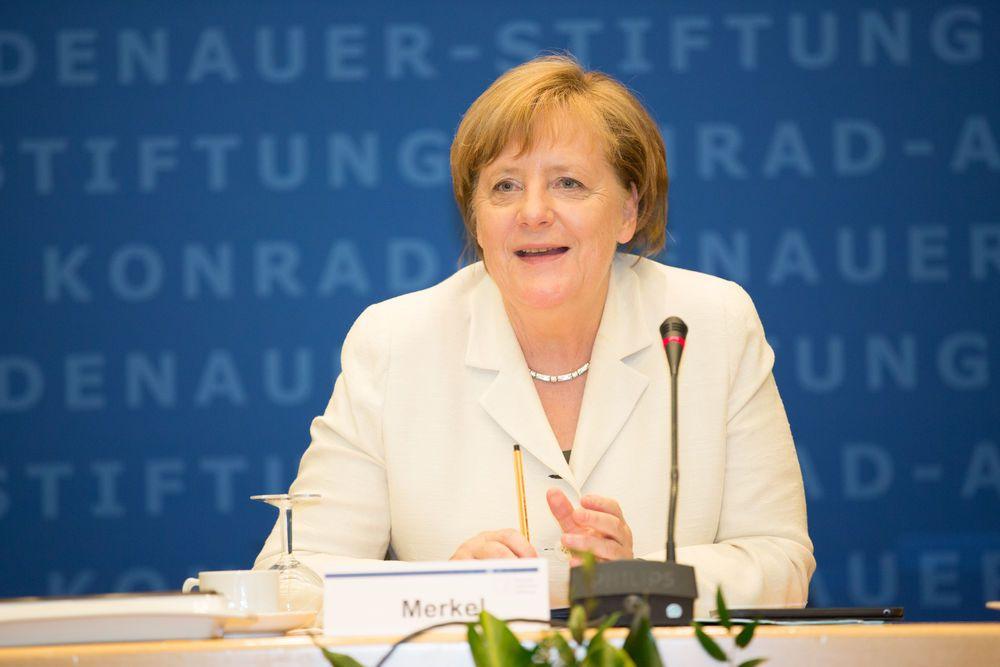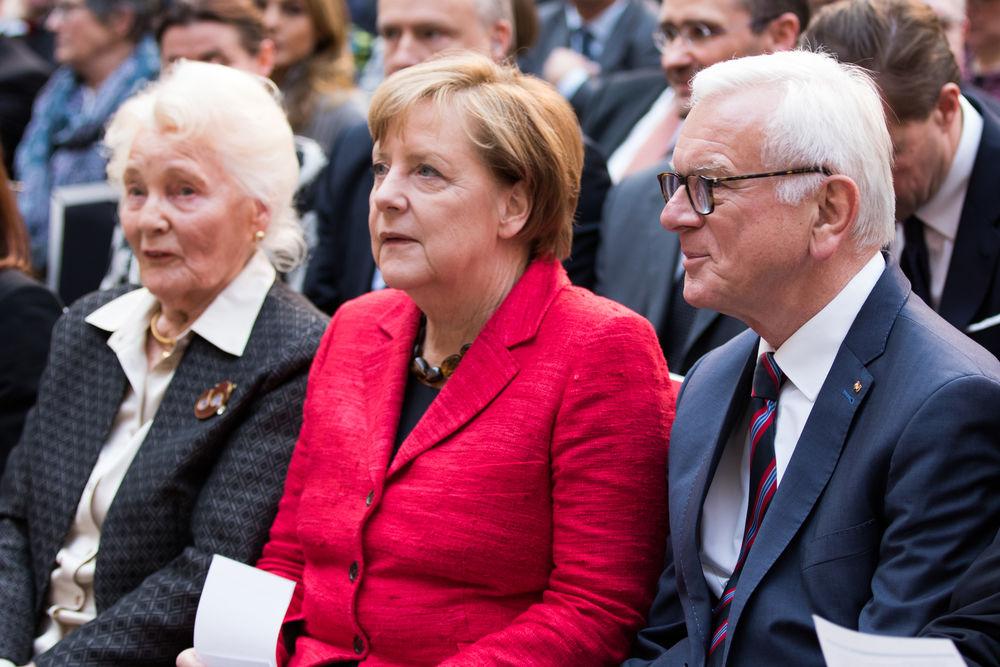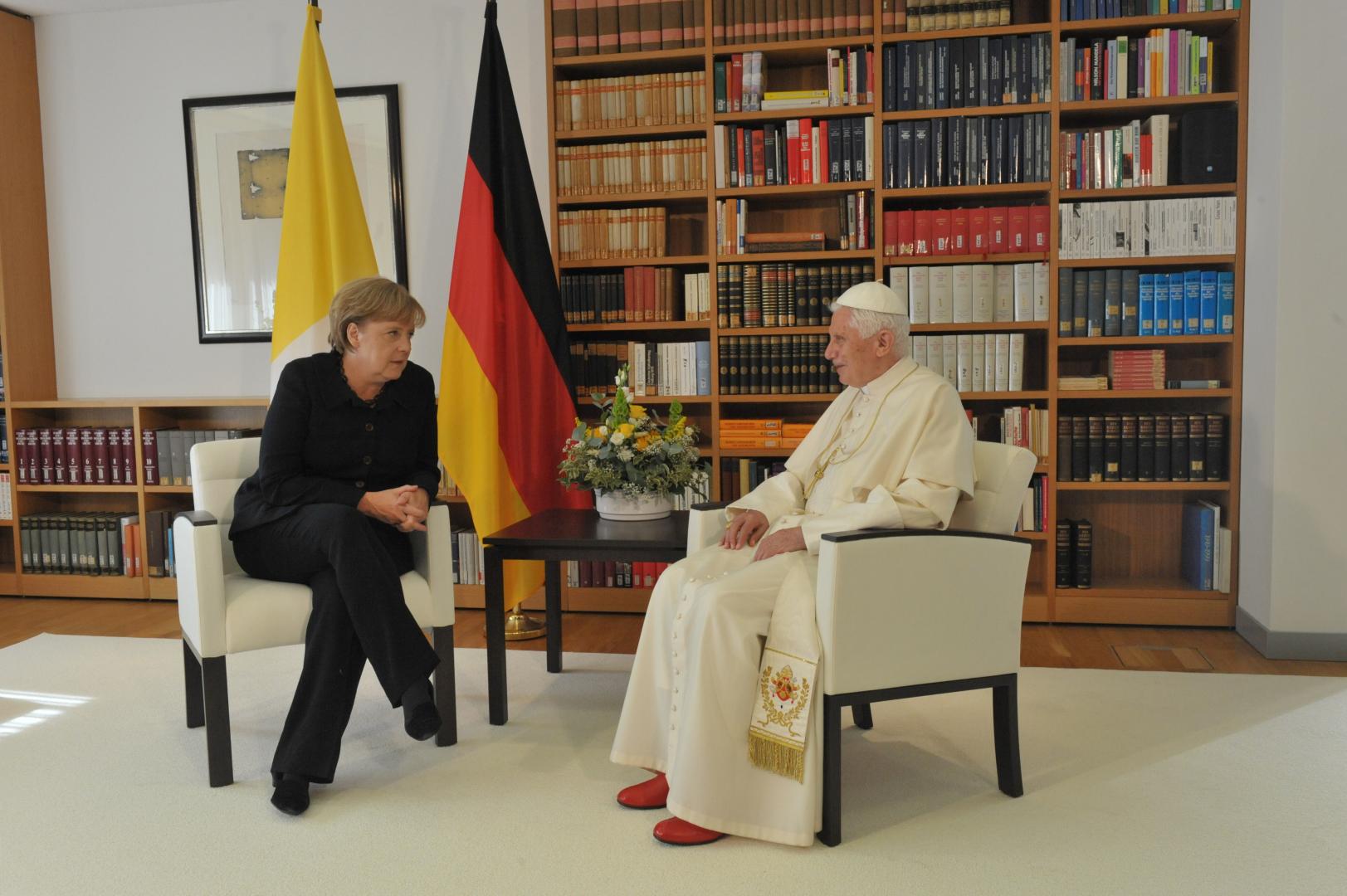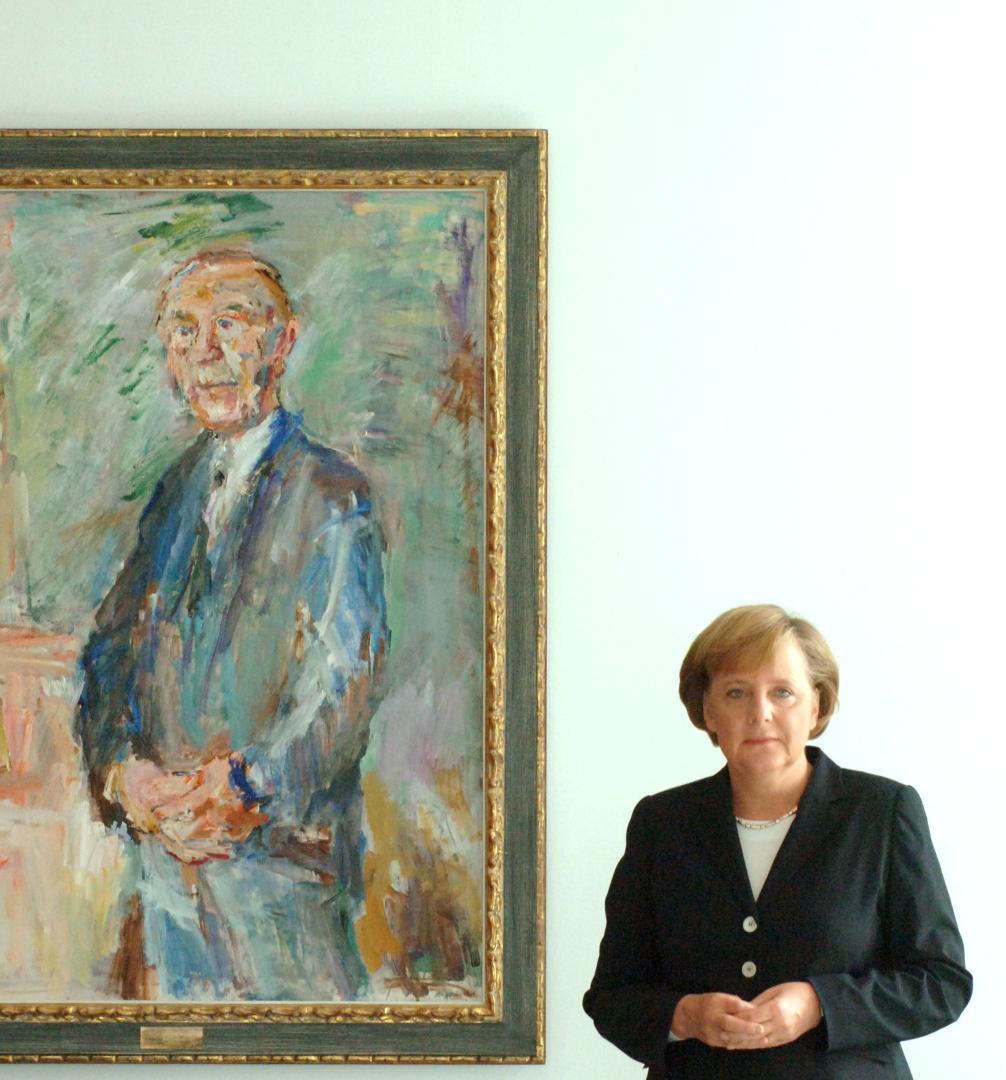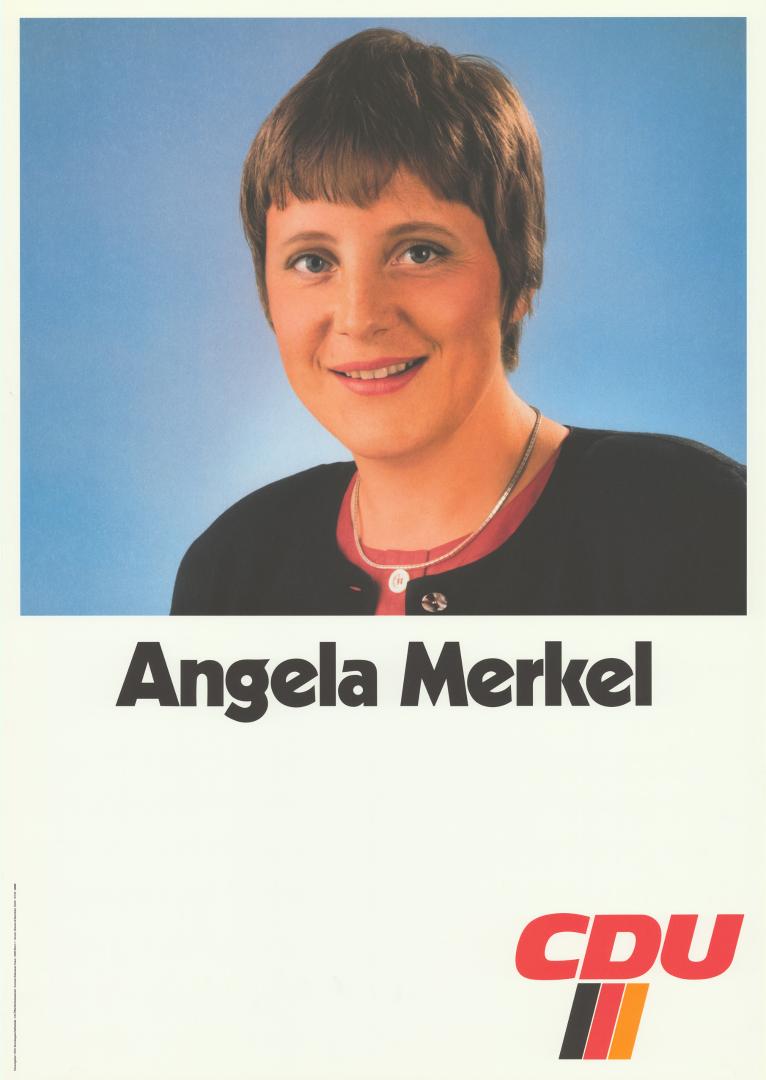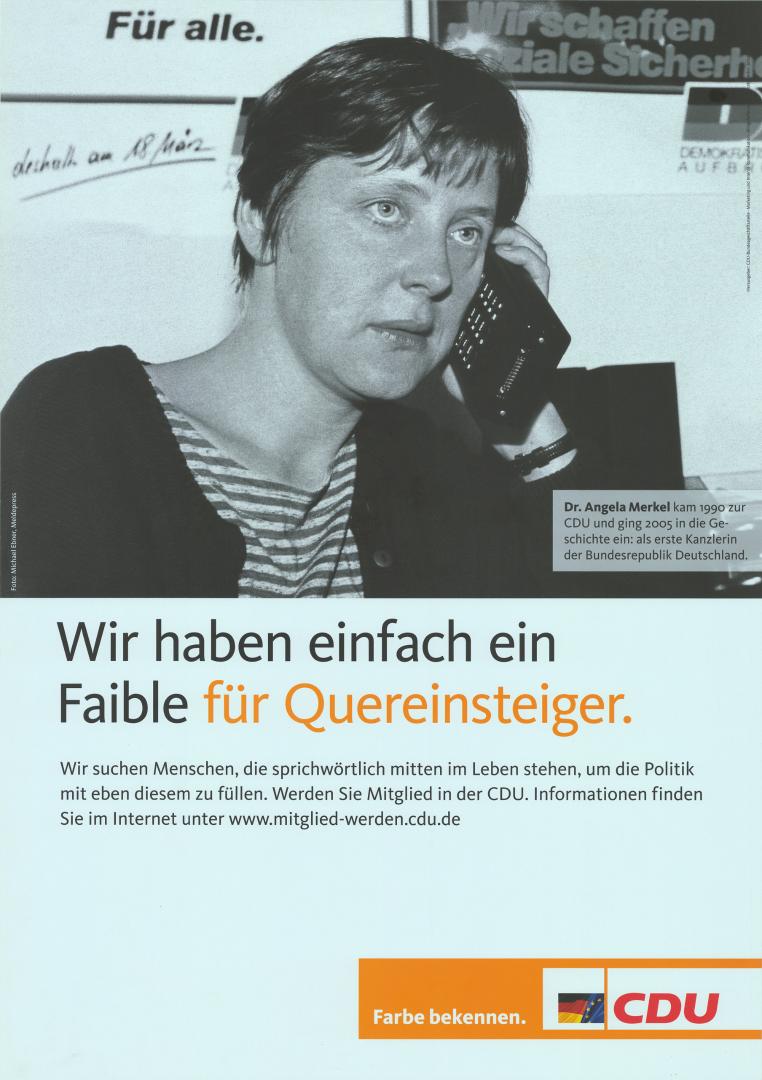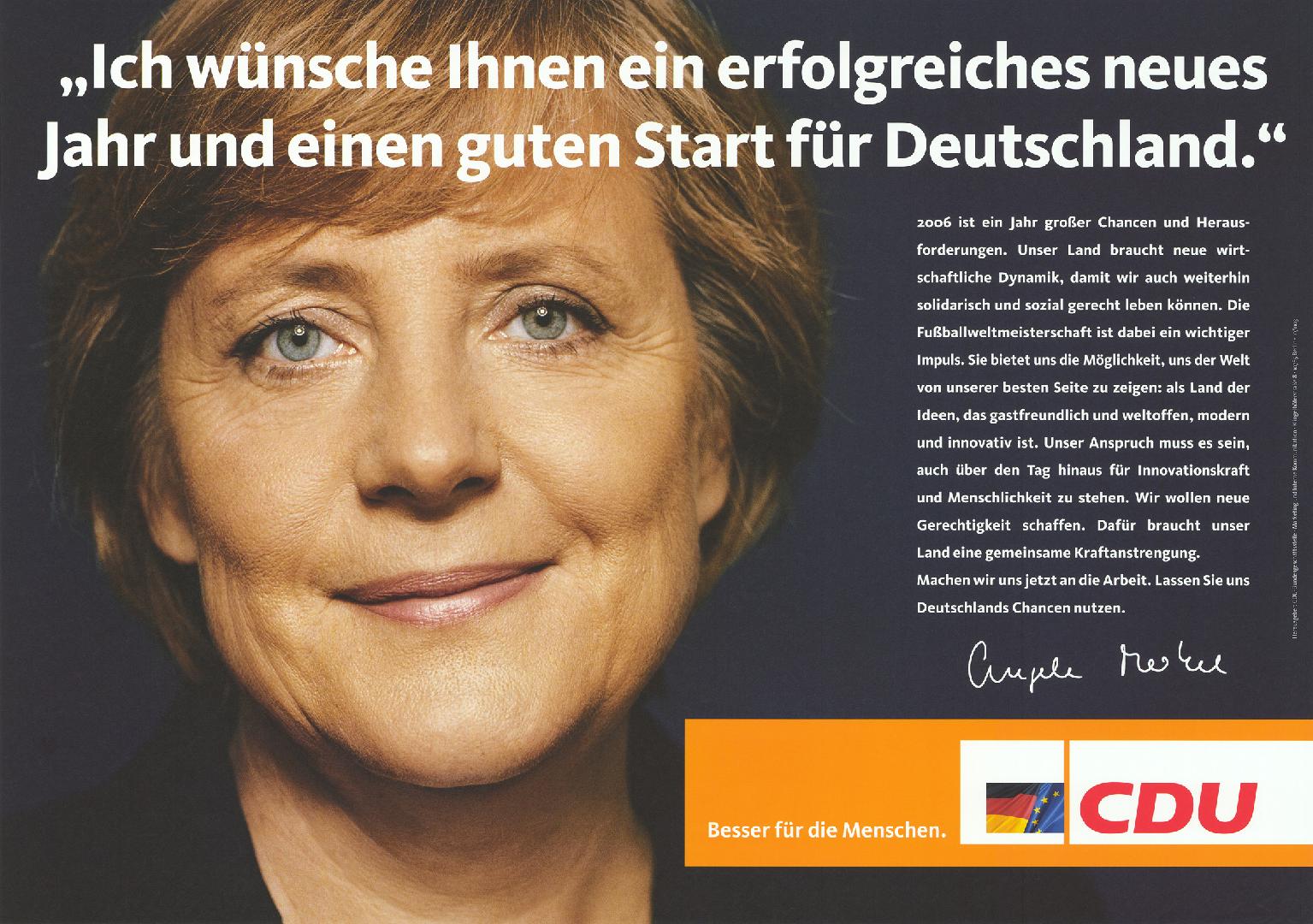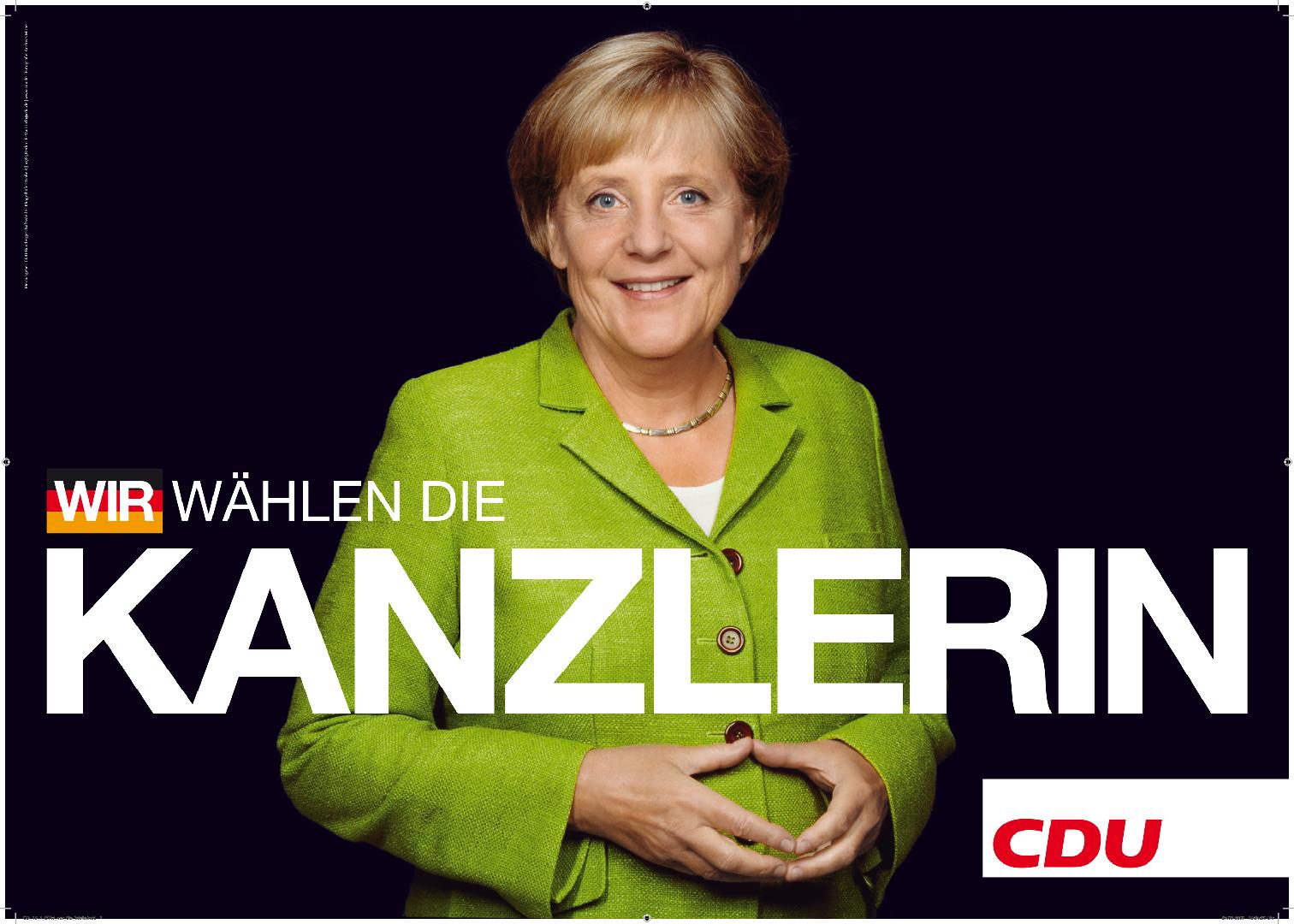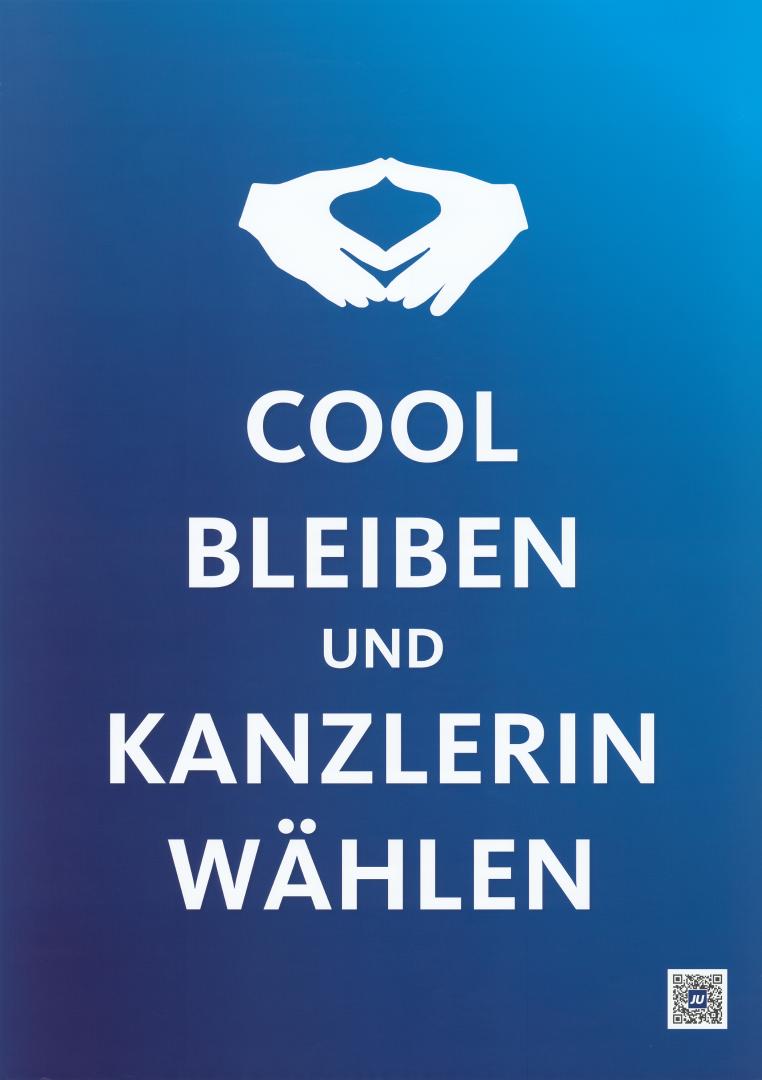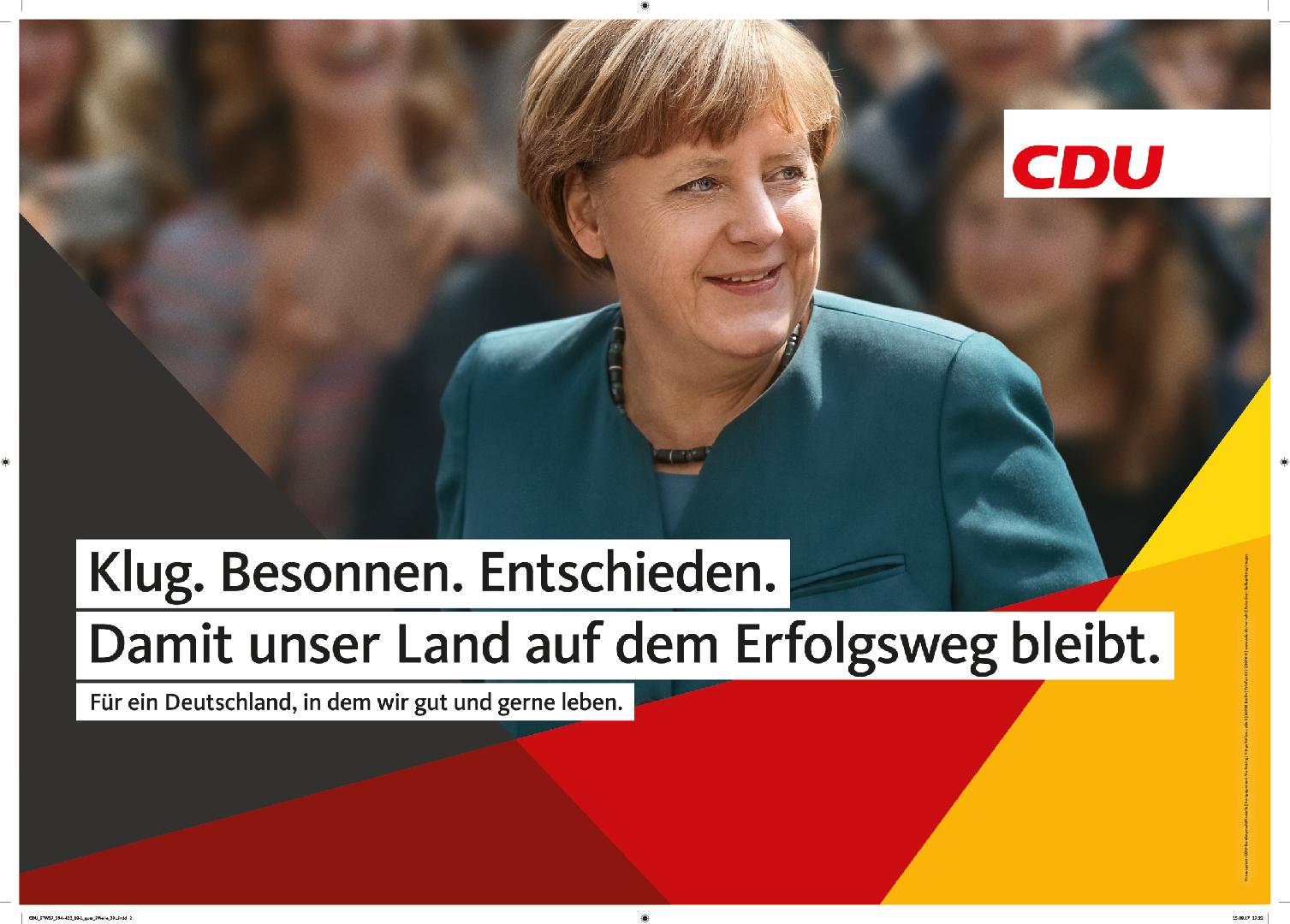Angela Merkel - Geschichte der CDU
Overview – Skip to a certain paragraph:
☛ School, Physics Studies and Marriage
☛ Divorce, Doctorate and Second Marriage
☛ Political Involvement in Democratic Awakening
☛ Rise in the CDU, Appointment as Federal Minister
☛ Initial Achievements as Minister for the Environment
☛ Chairwoman of the CDU in Difficult Times
☛ Declining the Chancellor Candidacy in 2002
☛ First Female Chancellor of the Federal Republic of Germany
☛ Reforms and Crisis Management with New Coalition Government in 2009
☛ Electoral Victory and Another Grand Coalition 2013
☛ Refugee Crisis – A Major Challenge of Her Chancellorship
☛ Renewal of the Grand Coalition after the 2017 Bundestag Election
From Hamburg to the GDR
Angela Dorothea Kasner was born on 17 July 1954 in Hamburg, the daughter of Protestant theologian Horst Kasner and Herlind Kasner, née Jentzsch, a school teacher. Several weeks after she was born, her father accepted a pastorate in the Evangelical Church under Bishop Otto Dibelius in the village of Quitzow (now part of Perleberg) in Berlin-Brandenburg. Her father was born in Berlin as Horst Kazmierczak in the year 1926. His parents, in turn, were from Poznań, which had been incorporated into Polish territory in the peace settlement following World War I. They thus belonged to the Polish minority population in the German Empire. Angela’s grandfather, Ludwig Kazmierczak, had moved to the German capital, Berlin, where he met his future wife Margarethe. In 1930, he adopted the surname Kasner, a Germanized form of Kazmierczak.
In 1957, Horst Kasner and his young family moved to Templin, where he helped to set up a continuing education institution of the Evangelical Church. Angela Kasner grew up in Templin with her family. Her mother was not admitted to the teaching profession in the GDR, so she remained at home and looked after the children. Marcus, the brother of Angela, was born on 7 July 1957, and her sister Irene was born on 19 August 1964. Her family life was shaped by Christian values and a cosmopolitan outlook.
School, Physics Studies and Marriage
In 1960, Angela Kasner started school at the Goethe-Schule in Templin, which she attended until the 8th grade. She earned especially good marks in mathematics and Russian. During her time at school, she belonged to the Ernst Thälmann Pioneer Organisation and then joined the Free German Youth (FDJ), the official youth organization of the ruling Socialist Unity Party (SED). She did not take part in the secular coming-of-age ceremony known as Jugendweihe, which was widely practised in the GDR. Instead, she was confirmed in the Church of St. Mary Magdalene in Templin on 3 May 1970. In 1973, she took her school leaving exams at the extended secondary school of her home town and earned the best possible average mark, 1.0.
Having developed an enthusiasm for the natural sciences, she began studying physics at Karl Marx University in Leipzig (now the University of Leipzig), which has a long tradition of excellence in the field. In 1974, as part of an exchange programme with Soviet students in Moscow and Leningrad, Angela Kasner met Ulrich Merkel, a young man from Cossengrün in Thuringia who was also studying physics. They were married in a church ceremony in Templin on 3 September 1977.
Divorce, Doctorate and Second Marriage
Angela Merkel acquired a Diplom (first degree) in physics in June 1978 with a dissertation on “The influence of spatial correlation on the reaction rate of bimolecular elementary reactions in dense media”. After completing her dissertation, she worked as a research associate in the Theoretical Chemistry Department of the Central Institute for Physical Chemistry at the Academy of Sciences in Berlin-Adlershof. She earned her doctorate in 1986 under the supervision of the department head, Professor Lutz Zülicke, a recognized expert in theoretical chemistry and in molecular structure and dynamics. The title of her doctoral dissertation was “Investigation of the mechanism of decay reactions with simple bond breaking and calculation of their velocity constants on the basis of quantum-chemical and statistical methods”. The work received a grade of ‘magna cum laude’ (with great distinction). In the GDR at that time, obtaining a doctorate also required demonstrating knowledge of Marxism-Leninism. To meet this requirement, Merkel submitted the paper “What is a socialist way of life?”, which received the grade of ‘rite’ – that was the worst possible grade to pass.
Merkel separated from her husband in 1981, and they divorced a year later. In 1984, she met Joachim Sauer, who was also working at the Academy of Sciences. At the time, he was writing a doctoral dissertation in the field of quantum chemistry. In 1990, he was certified as a lecturer by the Humboldt University of Berlin, where he was appointed full professor in 1993, occupying the chair of physical and theoretical chemistry. The couple married on 30 December 1998. Neither of Merkel’s marriages produced children.
Political Involvement in Democratic Awakening
During her years at university and her work as a physicist, Angela Merkel had little involvement in politics. She was not a member of the SED, did not belong to any of the GDR’s bloc parties and did not participate in any opposition groups associated with the Evangelical Church. She did, however, serve as a secretary of culture in the Freie Deutsche Jugend (FDJ). The Peaceful Revolution in the GDR gave rise to several movements in 1989, among them Demokratischer Aufbruch (Democratic Awakening – DA) and Merkel joined the new party. In December 1989, she worked as a temporary computer administrator, initially unpaid. As the party structure became more established, she was hired in February 1990 as a clerk for the DA’s chairman, Wolfgang Schnur, in the office in East Berlin. A short time later, she became press spokeswoman and a member of the DA executive committee.
Several days before the first free elections to the Volkskammer on 18 March 1990, it was revealed that Schnur had been an unofficial collaborator of the former Ministry of State Security (Stasi), and DA received only 0.9 percent of the popular vote. Nevertheless, DA was part of the bloc that won the most seats, the Alliance for Germany. This bloc, comprising the East German CDU (Christian Democratic Union), the German Social Union and DA, was supported by the West German CDU under the chairmanship of Helmut Kohl. Following the election, Merkel was appointed deputy government spokeswoman under Lothar de Maizière, the chairman of the CDU (East) and the GDR’s new head of government. The DA’s poor electoral result caused members to reflect on the future of their party during the reunification process. At a special party conference on 4 August 1990, the majority resolved to merge with the East German CDU, which in turn merged with its West German counterpart on 1–2 October 1990. Merkel was one of three delegates that the DA sent to the CDU unification party conference in her native city of Hamburg.
Rise in the CDU, Appointment as Federal Minister
With the restoration of German unity on 3 October 1990, Helmut Kohl’s government officially represented the whole country. It included several members of the former GDR government, including Angela Merkel, who initially worked as an assistant secretary in the Federal Press Office. The prospect of resuming her work at the Academy of Sciences seemed doubtful, because that institution was destined for restructuring under the terms of the German Reunification Treaty. Instead, she stood for the CDU in the first all-Germany Bundestag elections on 2 December 1990, winning a direct mandate for the constituency of Stralsund-North Western Pomerania-Rügen with 48.5 percent of the first votes. Following the election victory of the CDU/CSU and a renewal of the coalition with the FDP, Chancellor Kohl unexpectedly appointed Merkel to his cabinet as minister for women and youth. Her new role made her the first federal minister from the former GDR. Since Merkel lacked a power base of her own in the CDU, she stood as a candidate for the chair of the CDU state chapter for Brandenburg, losing to Ulf Fink. Soon afterwards, however, at the CDU national party conference of December 1991 in Dresden, she was voted into the office of deputy chairperson. Merkel stepped into the shoes of Lothar de Maizière in this position, which allowed her to find a footing in the party leadership. For a short time in 1992 and 1993, she also led the traditionally influential Evangelical Working Group of the CDU/CSU. In late 1990, Lothar de Maizière withdrew from politics and in 1993, Günther Krause, who had headed the GDR team in the negotiations over the Unification Treaty, stepped down as federal minister for transport after a controversy over the award of licences for autobahn service areas. At that point, in May 1993, Angela Merkel and Paul Krüger were the CDU’s only federal ministers from the former GDR. Just a month later, Merkel succeeded Krause as chairperson of the CDU state chapter for Mecklenburg-West Pomerania, a position that she held until 2000. This allowed her to consolidate her power within the party at the state level too. Around this time, she also began to make her mark as a minister. Merkel herself believed that one of her most important political achievements was the amendment of the Children and Youth Welfare Act, which provided an official entitlement to a kindergarten place for children beginning at age three.
Initial Achievements as Minister for the Environment
When Chancellor Kohl unexpectedly won the Bundestag election again in 1994 with the CDU/CSU and FDP, he appointed Angela Merkel to the position of minister for the environment, nature conservation and nuclear safety. Here she succeeded Klaus Töpfer, who was popular neither with the FDP nor the business wing of the CDU; he was given the Ministry of Regional Planning, Civil Engineering and Urban Development. One of Merkel’s first big successes was the UN Climate Conference in Berlin in 1995, at which she demonstrated her ability to foster dialogue and mediate between different parties. Through patient persuasion, she eventually succeeded in achieving a mandate for a global reduction in greenhouse gases. One lesson she drew from the negotiations was that even in difficult situations, results can be achieved when the different interests involved can be presented with the opportunity for a fair compromise.
Chairwoman of the CDU in Difficult Times
After the defeat of the CDU and CSU in the Bundestag election of 1998, Helmut Kohl stepped down from his position as CDU chairman. At the recommendation of his successor, Wolfgang Schäuble, Angela Merkel was elected the new general secretary at the national conference of the CDU in Bonn on 7 November 1998. When it transpired in November 1999 that Helmut Kohl had accepted undisclosed donations for the CDU in years past and that he was refusing to name the donors, Merkel wrote an article for the Frankfurter Allgemeine newspaper in which she called on the party to set a new course without Helmut Kohl. After Wolfgang Schäuble resigned as CDU chairman and chairman of the CDU/CSU parliamentary group in the Bundestag in February 2000, the leadership crisis presented Merkel with an opportunity to gain the party’s highest office. At the CDU national party conference on 10 April 2000 in Essen, Merkel was elected chairwoman of the party with 895 of 937 votes. This made her the first woman to occupy the position of party leader in the Christian democracy movement.
Declining the Chancellor Candidacy in 2002
In the run-up to the Bundestag election of 2002, Angela Merkel declined to stand as the chancellor candidate of the CDU and CSU, which cleared the way for Edmund Stoiber, the CSU chairman and then minister president of Bavaria. At the time, she did not believe that she had enough backing in the CDU/CSU, besides which several Landtag elections had not gone especially well for the Christian Democrats in the wake of the CDU donations scandal.
When the Social Democrats (SPD) and Greens of the Schröder/Fischer administration emerged as the winners again in the federal elections of 2002, Merkel became chairwoman of the CDU/CSU parliamentary group in the Bundestag and took on the role of opposition leader. In the following year, CDU successes in the Landtag elections held in Hessen and Lower Saxony strengthened the party’s position in the Bundesrat. Merkel supported important projects of the ‘red-green’ government (Social Democrats and Greens) such as Agenda 2010 (a series of labour market and welfare reforms), healthcare reform and the Hartz IV labour market reforms.
At the same time, Merkel asserted herself against a number of competitors in the CDU/CSU, notably Friedrich Merz, Roland Koch and Edmund Stoiber. Although Wolfgang Schäuble aspired to succeed Johannes Rau as federal president in 2004, Merkel supported Horst Köhler, who at that time was not well known to the public. During the phase of German reunification, Köhler had served as a secretary of state in the Federal Ministry of Finance. Later, he had become the managing director of the International Monetary Fund.
First Female Chancellor of the Federal Republic of Germany
A series of resounding SPD defeats in Landtag elections, especially in May 2005 in North Rhine-Westphalia, led Chancellor Schröder to call for early Bundestag elections on 18 September. Angela Merkel took this opportunity to stand for the office of chancellor for the first time on behalf of the CDU and CSU. The SPD and Greens lost their combined majority. The ensuing coalition talks led to the formation of a grand coalition of CDU/CSU and SPD, which elected Merkel chancellor on 22 November 2005, making her the first woman and the youngest person to hold the office.
Merkel’s governing style is typically described as matter-of-fact and unpretentious. She set new standards in her style of communication. She was the first head of government in the world to use the modern technology of video podcasts to explain government policy to the public, a practice she began in June 2006.
After taking office, her international profile quickly grew. In the first half of 2007, when Germany held the presidency of the Council of the European Union, she was able to resolve the crisis involving the EU Constitutional Treaty and to conclude the Treaty of Lisbon. Merkel was named the most powerful woman in the world each year from 2006 to 2009 by the American magazine Forbes. The global financial crisis that began in 2008 posed a special challenge for her. In a gesture of support for savers, banks and financial institutions, she appeared before the press in October and, in her calm and reassuring manner, guaranteed ordinary Germans that their savings deposits were secure. At the same time, she made efforts to reconcile the wide variety of financial interests that had emerged among European governments as a result of the crisis. In 2008, she was awarded the International Charlemagne Prize of Aachen for her contributions to Europe.
That same year, she became the first foreign head of government to address the Knesset in Israel, an event that likewise caused a stir in international politics. In her speech, Merkel emphasized that Germany bears a historical responsibility towards Israel. She also declared that the security of Israel is a matter of German national interest and will never be negotiable. The position that she took has won her great respect in Israel to this day.
Reforms and Crisis Management with New Coalition Government in 2009
In the Bundestag election of 2009, the CDU/CSU and FDP won a majority. Angela Merkel was finally able to form the coalition she wanted, and she was again elected chancellor on 28 October 2009. Her second term of office as chancellor focused on overcoming the ongoing European debt and banking crisis, which primarily affected Greece, Portugal and Ireland. Merkel supported the eurozone rescue package, including the Monetary Union Financial Stability Act – through which Germany assumed guarantees to maintain the solvency needed for financial stability in the European monetary union – and the Stabilization Mechanism Act of May 2010. These measures helped make it possible to support and stabilize the euro.
In October 2010, the federal government had extended the operating term of the 17 German nuclear power plants, effectively voiding the decisions of the Schröder/Fischer government from the year 2000. But after the tsunami and nuclear catastrophe in the Fukushima prefecture of Japan in March 2011, Merkel set German energy policy on a radically different course. Seven old nuclear power plants were shut down. In June, the federal government decided that Germany would cease operating nuclear plants entirely by the year 2022.
Merkel continued her programme of modernisation despite critics from within her own party. In 2010, after some initial hesitation, she accepted a proposal by Karl-Theodor zu Guttenberg, her minister of defence, and lobbied the CDU/CSU to endorse his proposed reform of the German armed forces. This led, in March 2011, to the suspension of compulsory military service, which had existed since 1956; the Bundeswehr thus became a fully professional army.
In the field of domestic policy, she made special efforts to promote the better integration of foreigners into German society and tried to improve the situation of working women and mothers. Merkel made a point of supporting women in their campaigns for higher office. Examples include Christine Lieberknecht and Annegret Kramp-Karrenbauer, who were each elected minister president, and Julia Klöckner, who was elected deputy CDU chairperson. Ursula von der Leyen, Maria Böhmer and Annette Schavan have had the support of Merkel, as have Johanna Wanka, Emine Demirbüken-Wegner and Monika Grütters.
When President Horst Köhler announced his resignation in May 2010 as a result of statements he had made about foreign deployments of the Bundeswehr, Merkel proposed Christian Wulff, the minister president of Lower Saxony, for the office. As the candidate of the governing coalition, Wulff had enough support to defeat his rival Joachim Gauck, the candidate of the SPD and Alliance 90/The Greens, in the third ballot. When Wulff resigned on 12 February 2012 because of corruption allegations and a loss of confidence, Merkel accepted Joachim Gauck as the joint candidate of the SPD, Alliance 90/The Greens, FDP and CDU/CSU.
Electoral Victory and Another Grand Coalition 2013
Voters in the Bundestag election on 22 September 2013 rewarded Angela Merkel’s party for the prudent policies of her government during the European debt crisis, which Germany survived without major damage to its economy and labour market. In her own constituency, Merkel received 56.2% of the first votes, a gain of 6.9% over the previous election. Despite the electoral victory of the CDU and CSU with 41.5% of the second votes, Merkel was once more compelled to change coalition partners. This was because the FDP had won only 4.8% of the votes cast, short of the 5% minimum that German electoral law requires for representation in the Bundestag. Brief consideration was given to a coalition involving the CDU and the Greens, which would have been the country’s first, but exploratory talks came to nought because of internal disagreement within Alliance 90/The Greens. The CDU and CSU therefore formed a new grand coalition with the SPD. On 17 December 2013, Merkel was elected to her third term as chancellor with 462 of the 621 votes cast in the Bundestag.
The formation of the new government and the election of the chancellor were overshadowed by a surveillance and espionage scandal involving the American intelligence agency NSA. In October 2013, it came to light that the agency had been eavesdropping on Merkel’s cell phone for years. Despite that, Merkel continued to engage in crisis management, always seeking to play the role of conciliator among the different interests involved. In February 2014, as the crisis in Ukraine escalated, she tried to serve as a mediator in numerous discussions with President Barack Obama, President Vladimir Putin and partners in the EU. In part for her efforts toward resolving the Ukraine crisis, Merkel was named the 2015 ‘Person of the Year’ by the US magazine Time, making her the first German to be awarded that distinction since Willy Brandt in 1970.
With regard to the United States, Merkel was able to establish a relationship of mutual trust with Barack Obama and succeeded in reviving German-US relations despite the NSA scandal. However, with the emergence of President Donald J. Trump, a Republican who had campaigned with the slogan ‘America first’ in the 2016 election, the relationship deteriorated markedly. The New York Times called Merkel the “last defender of the liberal West” in acknowledgement of her support for liberal values. Following a meeting of the G7 in May 2017, the behaviour of the US president led her to conclude “that the days when we could fully rely on others [...] are to some extent over”. “We Europeans,” she said, “have to take our fate into our own hands”.
Refugee Crisis – A Major Challenge of Her Chancellorship
The mass influx of refugees that began unexpectedly in 2015 became the greatest challenge of Angela Merkel’s third term of office. Civil wars in Syria, Iraq and Afghanistan (the primary countries of origin) resulted in the largest refugee flows since the Second World War and a crisis that dominated political discourse. During the previous year, increasing anxiety about the future and a subjective sense of growing insecurity had already led to criticism of immigration policy and boosted new populist movements. The Pegida movement (‘Patriotic Europeans against the Islamization of the West’) and the political party AfD (‘Alternative for Germany’) tapped into these feelings and exploited them for their own agendas.
A turning point for Germany’s asylum policy came in September 2015, when the government decided on humanitarian grounds that refugees stuck in Budapest and at Hungary’s border with Austria would be allowed to enter Germany without having to register in Hungary, as would normally have been required by the Dublin Regulation. The position Merkel took earned her great respect in Germany and abroad, but aroused growing criticism – also from figures in her own party.
Faced with the refugee crisis, she focused on the pan-European dimension of the problem, an outlook reflected by her policy priorities: better control of external European borders, greater efforts to address the root causes of migration in countries experiencing armed conflict, accelerated asylum procedures, and a more rigorous and consistent integration policy in tandem with a rejection of parallel societies. Chancellor Merkel’s efforts led, in early 2016, to an agreement between the EU and Turkey that brought about a major decrease in refugee arrivals. Under the terms of the agreement, Turkey promised to take back refugees already in Greece in exchange for compensation payments, which more or less closed the Aegean route for migrants trying to reach Europe from Turkey.
In subsequent years, refugee policy periodically caused tensions between the CDU and its coalition partner CSU, which strongly favoured action at the national level. Merkel, however, stayed true to her principle of seeking European solutions.
Renewal of the Grand Coalition after the 2017 Bundestag Election
In the Bundestag election on 24 September 2017, the CDU and CSU suffered heavy losses and captured only 32.9 percent of the second votes, their worst outcome since 1949. The SPD also suffered dramatic losses and obtained its worst result in a Bundestag election since the Second World War. Reacting to this poor result, the SPD’s chancellor candidate, Martin Schulz, categorically ruled out another grand coalition during a round-table discussion among political heavyweights on the election night. That left only one option for forming a stable majority: a coalition of CDU/CSU, FDP and Greens, which would have been the first such coalition at national level. Exploratory talks were launched, but despite initial optimism, they broke down on the night of 19 November 2017. The FDP leader, Christian Lindner, announced that his party was no longer willing to participate in such a coalition.
Following intensive consultations with the federal president – and despite considerable resistance within its own ranks – the party leadership of the SPD finally changed course and agreed to hold exploratory talks with the CDU.After coalition talks, the SPD held an internal vote, in which 66 percent of its members agreed to another grand coalition. On 14 March 2018, Angela Merkel was again elected chancellor with 364 of the 692 votes cast, 355 votes were needed. In the Landtag elections in Bavaria and Hessen on 28 October 2018, the CDU and CSU suffered considerable losses. In the customary meeting of the CDU executive committee on the day after the elections, Merkel unexpectedly announced that she would no longer stand for the party chair at the next party conference. She also made clear that she had no intention of standing for election as chancellor again after the end of her term in 2021.
Back in February 2018, Merkel had nominated Annegret Kramp-Karrenbauer as the new general secretary of the CDU. At the CDU national party conference on 7 December 2018 in Hamburg, it was Kramp-Karrenbauer who succeeded Merkel as the national chairperson and thus the leader of the party. The former minister president of Saarland had succeeded in edging out rival contenders Friedrich Merz and Jens Spahn in an open contest that was without precedent in the CDU.
Merkel led and shaped the party for eighteen years. Only Helmut Kohl served as the head of the CDU for a longer time.
Private Interests
Not much is known about Angela Merkel’s private interests. By her own account, she is a passionate gardener who tends her own vegetable patch. She is said to enjoy cooking and baking, and she is evidently also an enthusiastic football fan who is sometimes seen at major national and international matches. When on holiday, she enjoys swimming and hiking in the summer and cross-country skiing in the winter. She loves classical music, especially opera, and never misses the Bayreuth Festival.
The original german text was translated by Richard Toovey.
Curriculum vitae
- 1973 Completes secondary education (Abitur)
- 1973–1978 Student of physics in Leipzig
- 1978 First degree in physics (Diplom)
- 1978–1990 Research associate at the Central Institute for Physical Chemistry of the Academy of Sciences in Berlin
- 1986 Doctoral degree
- 1989 Member of Demokratischer Aufbruch (Democratic Awakening)
- 1990 Joins the CDU
- 1990 Deputy government spokeswoman of the GDR government under Lothar de Maizière
- 1990–2021: Member of the Bundestag
- 1991–1998 Deputy chairwoman of the CDU
- 1991–1994 Federal Minister for Women and Children
- 1992–1993 Chairwoman of the Evangelical Working Group of the CDU/CSU
- 1993–2000 Chairwoman of the CDU in the state of Mecklenburg-West Pomerania
- 1994–1998 Federal Minister for the Environment, Nature Conservation and Nuclear Safety
- 1998–2000 General secretary of the CDU
- 2000–2018 Chairwoman of the CDU
- 2002–2005 Chairwoman of the CDU/CSU parliamentary group
- 2005–2021 Chancellor of the Federal Republic of Germany



